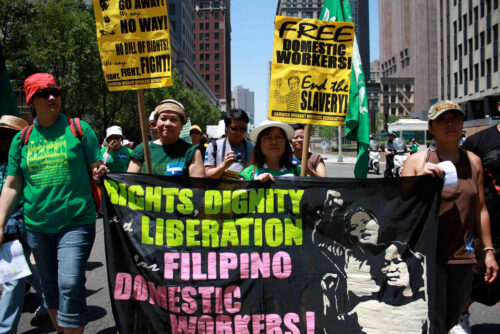Members of DWU speak confidently about the value of the work they do. They argue that without the labor of the estimated two hundred thousand domestic workers in New York City, the economy will grind to a halt: stockbrokers, lawyers, doctors, secretaries, professors, and politicians would be unable to go to work, enjoy leisure time, or complete some of the tasks necessary for day-to-day household maintenance. Domestic workers’ daily chores of cooking, cleaning, and caring for children give most professionals the ability and peace of mind to carry out their responsibilities. Domestic workers are, according to DWU, the “invisible backbone” of New York City’s economy. They know there is dignity in the work they do, and they insist on being treated with a corresponding amount of respect.
DWU has fostered innovative organizing campaigns. Traditional labor strategies such as strikes are not a viable option because of the multitude of employers, who generally only hire one employee, and the ease with which employees can be replaced. Because the vast majority of workers are employed in isolated settings, the workplace is not an effective site for organizing. DWU has utilized pioneering labor strategies, holding public “shaming” demonstrations to embarrass abusive employers, sponsoring testimonials, creating support groups for isolated workers, and pushing for protective legislation.1 As they build their movement, DWU organizers—housekeepers and nannies with their charges in tow—converge on the playgrounds of this global city. Some of them use their precious days off to assist in the mobilization effort. They carry buttons, brochures, and flyers, and sit down to chat with other domestic workers about the kinds of work conditions and exploitative situations they have experienced—and, more importantly, to talk about what they, collectively, can do about it.
The current New York State bill of rights is one proposal designed to address the circumstances surrounding the occupation. It calls for paid vacations and holidays, paid sick leave, advance notice of termination, severance pay, overtime pay, either healthcare coverage or a wage supplement to pay for medical needs, regular cost of living increases, and up to twelve weeks of family and medical leave. While many of these demands will simply bring domestic work in accordance with the basic labor rights afforded to most other workers, other demands take into account the specific characteristics of an occupation in which employees are frequently let go and often expected to work well beyond the standard eight hour day. The legislation is being watched by cities and states around the country. It is a model that could transform domestic work, bringing much-needed respect and recognition to an occupation that is a foundation for so much other work that gets done.
- Eileen Boris and Premilla Nadasen, “Domestic Workers Organize!” Working USA: The Journal of Labor and Society 11 (2008): 413-437; Monisha Das Gupta, “Housework, Feminism, and Labor Activism: Lessons from Domestic Workers in New York,” Signs: A Journal of Women in Culture and Society 33 (2008): 532-37; Hondagneu-Sotelo, Domestica. [↩]




